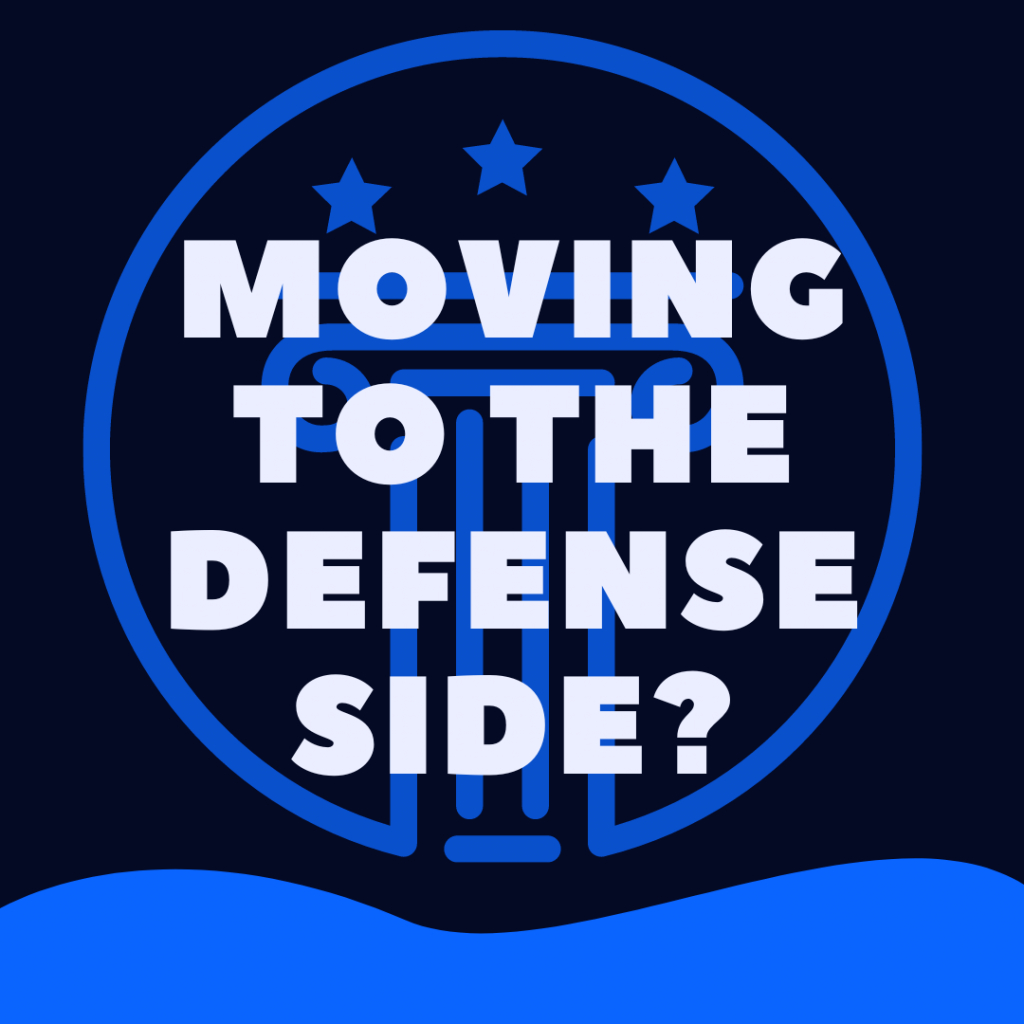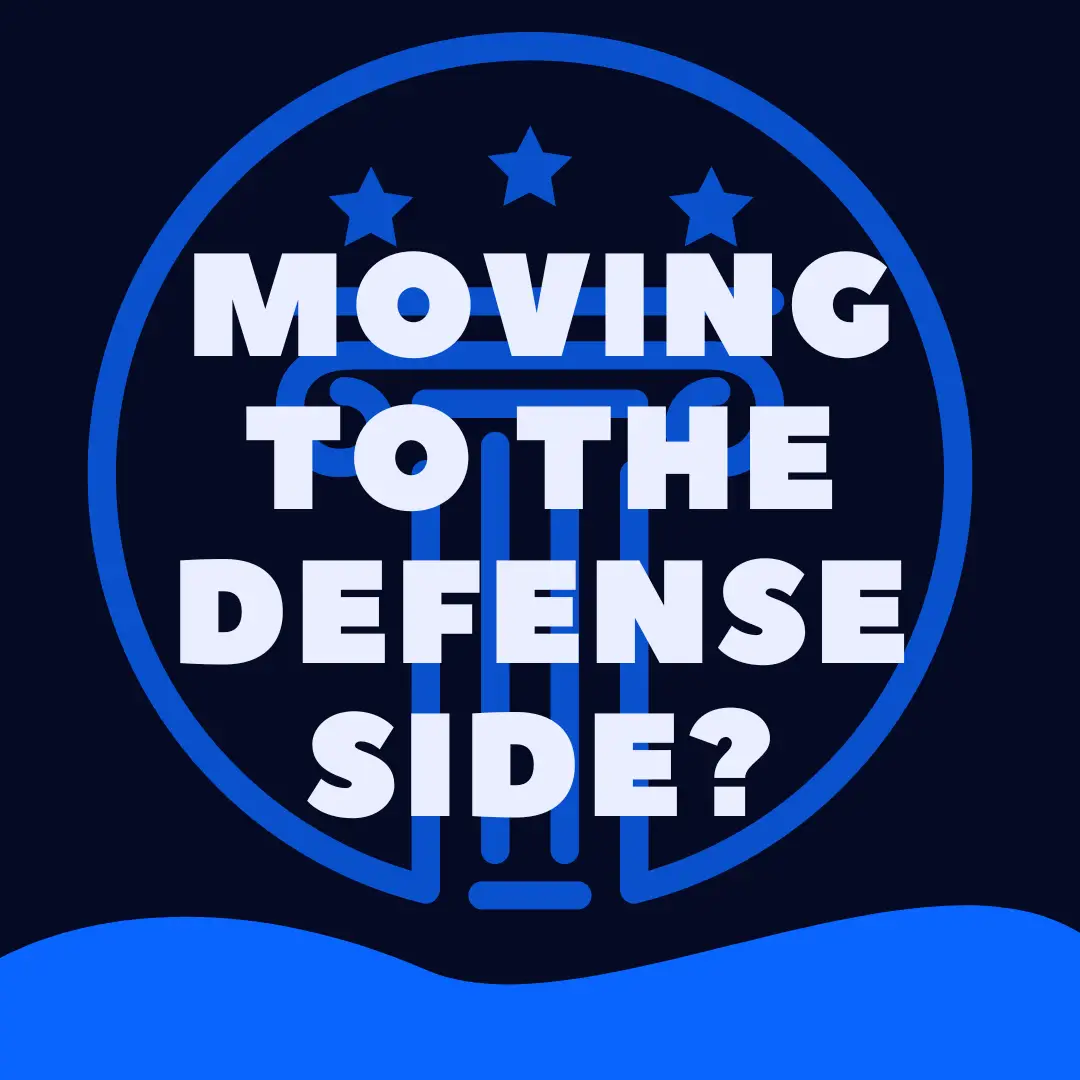Prosecutors become defense attorneys for many reasons, including: money, control, safety, new challenges, and quality of life.
In the article that follows, we’ll explain.
Why Do Prosecutors Become Defense Attorneys? (Discussion)
Disclaimer
The contents of this web page are for informational purposes only, and nothing you read is intended to be legal advice. Please review our disclaimer about law/legal-related information on this website before taking action based upon anything you read or see.
Life of a Prosecutor
While it can personally satisfying to be on the ‘side of right,’ the job of a prosecutor is not always a dream.
Prosecutors often carry extremely heavy case loads, and their days can be hectic, running from appearance to appearance around the courthouse.
Junior level prosecutors are subject to the supervision and direction of the senior attorneys and the policies set by the elected head of the office.
While they do make charging decisions and handle negotiations, the overall strategic moves of the junior prosecutor need to be in line with those of the elected prosecutor.
Better Money?
While prosecutors often earn better salaries than public defenders, they may not earn more money than private retained defense attorneys.
Prosecutors are employed by the government, and the government sets the range and ceilings for its salaried employees.
While junior prosecutors can work hard to earn steps up in the salary scale, their day to day efforts can’t produce more revenue and may not actually do anything to earn a raise.
Eventually, the prosecutor hits a budgetary ceiling, and no matter the skills or efforts, there is no more money to be earned.
In contrast, an attorney who works for a private firm has a lot of opportunity to earn more money with effort.
Depending on the private attorney’s relationship with the law firm (or working for himself), the attorney’s efforts on a day to day basis can produce dramatic impacts to the attorney’s earnings and the bottom line of the office as a whole.
Some attorneys like the security of a steady paycheck, even if that paycheck isn’t amazing.
But others want more.
More Control?
Prosecutors are government employees.
As such, they may have limited amounts of vacation time and little control over when they arrive and leave during the day.
Senior attorneys assign junior attorneys the cases the senior attorneys think the junior attorney is ready for.
The junior attorney may have little say over what kinds of cases he works on, or how many he works on.
Even if the junior attorney feels ready for something more complex, he may have to wait until someone senior above him moves on to open up that opportunity.
In contrast, a private retained defense attorney (not public defenders) have a ton of control over the cases they take, especially if they are the firm owner or partner.
A defense attorney doesn’t have to take any case he doesn’t want, can handle, or feel interested in.
At the beginning of his career, an attorney has little control over his work.
But as he gains experience, defense attorneys have a lot of control over when they work, how much they work, and the complexity of the work they do.
While taking a month long vacation can be a financial hit, as a business owner, you have the ability to do so as you wish.
Sometimes, prosecutors just don’t want to answer to anyone anymore, they don’t want a supervisor, and they don’t want a boss.
They are tired of being told what to do.
Working for themselves as a defense attorney is a proven way to achieve that change.
Safety
A prosecutor is a law enforcement officer.
There are a lot of bad folks out there who don’t like law enforcement officers very much.
Many prosecutors start right out of law school, before they have significant others or children.
They are not terribly vulnerable.
But as prosecutors have families, they can start to feel that vulnerability more strongly.
Some prosecutors decide to leave the field in order to reduce the risk of any danger to their family members.
New Challenges
Many prosecutors get pigeon-holed into one kind of case.
They become experts in that area of criminal law, and can easily charge, investigate, negotiate, and try cases in that area.
But over time, even the changing facts are not enough to keep the work interesting.
Boredom does happen.
Defense attorneys, on the other hand, are presented with many unique challenges on a daily basis, even in areas of law they are familiar with.
Further, a private attorney can move into other areas of law that compliment his skillset.
With their trial experience, former prosecutors are often excellent personal injury/tort lawyers.
As a prosecutor, moving into a completely different area of law is not a possibility.
Quality of Life
Prosecutors often work long hours, evenings, and weekends.
Their life can be stressful, and that can have negative impacts upon their physical health and appearance.
The commitment to the job can harm relationships and make it difficult to be the parent and friend they want to be.
Moving to private retained work may have the goal of working less and having more flexibility, though this may or may not be possible right away.
Prosecutors Make Good Private Attorneys
Prosecutors often make excellent retained lawyers on the private side, especially in cases involving trial work.
To be a good trial lawyer, the lawyer must be able to:
- research and write legal briefs
- review pleadings
- prepare and file motions
- review and manage evidence/discovery
- hire and manage expert witnesses
- prepare witnesses
- prepare for trial
- know the rules of evidence
- handle voir dire
- argue opening and closing
- make and argue objections
- prepare jury instructions
These skills can take years to hone on the civil side, as jury trials are much more rare for lawyers (maybe a couple a year).
A prosecutor, on the other hand, might do the same amount of trial work in a month.
As a result, they tend to have better trial skills earlier on in their careers.
Prosecutors don’t have to become private retained defense attorneys, but they often do at first because they already understand the law, criminal procedure, the court in their community, and can get started right away with little to no supervision.
The Path To The Defense
While lifetime drank ‘drank the Kool-Aid’ prosecutors hate to hear this, the best path to becoming the best possible defense attorney is probably to be a prosecutor first.
The best person to understand and challenge the work of a prosecutor is….another prosecutor.
With the experience of handling hundreds of criminal cases, a defense attorney is in a much better position to tell a client what might happen, what usually happens, and what can be done about it.
After all, he would have done all of it from the other side.
Wrap Up
Want to learn more about your criminal justice system?
Browse our free legal library guides for more information.
You might also like:
- State Attorney vs District Attorney (Compared)
- Attorney General vs District Attorney (Compared)
- City Attorney vs District Attorney (Compared)
- Why Would a District Attorney Be Looking For Me?
- How Does a District Attorney File Charges?
- Can a Victim Talk To a District Attorney?
- Why Do Prosecutors Become Defense Attorneys?
- 5 Benefits of Plea Bargaining For Prosecutors
- When Does a Prosecutor Give Closing Arguments?
- How Do Prosecutors Get Paid?


